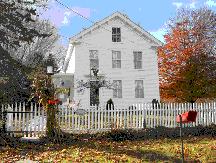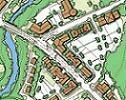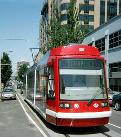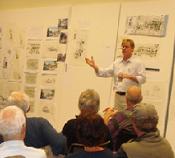 Projo photo / Steve Szydlowski
Projo photo / Steve Szydlowski
Hope Valley retains itsmill village charm
Projo's Neighborhood of the Week
Pictured above is a house on Spring Street in Hope Valley, which features many historical mill properties. In 1824, Gardner Nichols bought the mills and renamed the village around them Hope Valley because all his hopes were centered there.
Today, many of the neighborhood's historical residences and industrial buildings are restored and still in use.
Read more
|
|


Grow Smart Rhode IslandBoard of
Directors
Deming E. Sherman
Chairman of the Board
Susan Arnold
William Baldwin
Rebecca G. Barnes
Samuel J. Bradner
Kenneth Burnett
Joseph Caffey
Robert L. Carothers
Jen Cookke
Trudy Coxe
Dennis DiPrete
Stephen Durkee
Stephen J. Farrell
John R. Gowell, Jr.
Akhil C. Gupta
Michael S. Hudner
Stanley J. Kanter
Howard M. Kilguss
Dennis Langley
James Leach
The Rev. James C. Miller
Thomas V. Moses
William M. Pratt
B. Michael Rauh, Jr.
Richard Schartner
Lucie G. Searle
Pamela M. Sherrill
John C. Simmons
Curt Spalding
James F. Twaddell
Directors Emeritus
Arnold "Buff" Chace
Louise Durfee, Esq.
J. Joseph Garrahy
Michael F. Ryan
Frederick C. Williamson
W. Edward Wood
Board Listing with
Affiliation
Staff
Scott
Wolf
Executive Director
Sheila
Brush
Director of Programs
John
Flaherty
Director of Research &
Communications
Leslie
Denomme
Executive Assistant for Finance
Dorothy
Dauray
Office Assistant
Lauren
Pendergast
Training Coordinator
|
Visit our Smart GrowthResource Directory

Miss a previous e-brief?

Do you liveor work in this zone?

|
| |
Dear John,
You're among the 3,690 civic leaders,
state & local officials, development professionals,
journalists and visionary citizens getting the latest
news, happenings and trends in the smart growth
movement from Grow Smart
Rhode Island.
|
| |
| |
|
| President-Elect Obama on smart growth, transportation, cities, and regions |
| |

The following excerpts from President-Elect Obama's
speeches and position papers provide some insight
into what an Obama Administration means for smart
growth, sustainable development, and metropolitan
America. Statements suggest the President-Elect is
more serious about these issues than any other
modern president.
On smart growth,
transportation and oil...
Candidate Obama explicitly recognized the benefits of
smart growth in his campaign material.
 "Over the
longer term, we know that the amount of fuel we will
use is directly related to our land use decisions and
development patterns, much of which have been
organized around the principle of cheap gasoline.
Barack Obama believes that we must move beyond
our simple fixation of investing so many of our
transportation dollars in serving drivers and that we
must make more investments that make it easier for
us to walk, bicycle and access transportation
alternatives." "Over the
longer term, we know that the amount of fuel we will
use is directly related to our land use decisions and
development patterns, much of which have been
organized around the principle of cheap gasoline.
Barack Obama believes that we must move beyond
our simple fixation of investing so many of our
transportation dollars in serving drivers and that we
must make more investments that make it easier for
us to walk, bicycle and access transportation
alternatives."
On cities and rural
areas...
The President-Elect's position paper on urban
policy demonstrates in several places that he
understands the connections between
neighborhoods, cities, and metropolitan regions. For
example, in a section on city livability,
he stresses the importance of transportation
alternatives, green buildings, and even that "how a
community is designed - including the layout of its
roads, buildings and parks - has a huge impact on the
health of its residents." For rural areas, his platform has
included conservation of private lands, regional food
networks, and help for organic farmers.
On the new
metropolitan reality ...
As we reported in June, candidate Obama gave a
major
address to the US Conference of Mayors during
which he asserted that current urban policy was
obsolete and needed to be replaced by a model that
focused on rational metropolitan growth:
 The top 100
metro areas generate two-thirds of our jobs, nearly
80% of patents, and handle 75% of all seaport
tonnage. In fact, 42 of our metro areas now rank
among the world's 100 largest economies. "To seize
the possibility of this moment, we need to promote
strong cities as the backbone of regional growth. And
yet, Washington remains trapped in an earlier era,
wedded to an outdated 'urban' agenda that focuses
exclusively on the problems in our cities, and ignores
our growing metro areas. Strong cities are the
building blocks of strong regions, and strong regions
are essential for a strong America....that is the new
metropolitan reality and we need a new strategy that
reflects it . . ." The top 100
metro areas generate two-thirds of our jobs, nearly
80% of patents, and handle 75% of all seaport
tonnage. In fact, 42 of our metro areas now rank
among the world's 100 largest economies. "To seize
the possibility of this moment, we need to promote
strong cities as the backbone of regional growth. And
yet, Washington remains trapped in an earlier era,
wedded to an outdated 'urban' agenda that focuses
exclusively on the problems in our cities, and ignores
our growing metro areas. Strong cities are the
building blocks of strong regions, and strong regions
are essential for a strong America....that is the new
metropolitan reality and we need a new strategy that
reflects it . . ."
On infrastructure,
transit, and rail... In the same speech,
Obama the candidate took a bold position on
transportation:
 "Let us invest money in a world-class transit
system. Let's re-commit federal dollars to strengthen
mass transit and reform our tax code to give folks a
reason to take the bus instead of driving to work -
because investing in mass transit helps make metro
areas more livable and can help our regional
economies grow. And while we're at it, we'll partner
with our mayors to invest in green energy technology
and ensure that your buses and buildings are energy
efficient. And we'll also invest in our ports, roads, and
high-speed rails . . ." "Let us invest money in a world-class transit
system. Let's re-commit federal dollars to strengthen
mass transit and reform our tax code to give folks a
reason to take the bus instead of driving to work -
because investing in mass transit helps make metro
areas more livable and can help our regional
economies grow. And while we're at it, we'll partner
with our mayors to invest in green energy technology
and ensure that your buses and buildings are energy
efficient. And we'll also invest in our ports, roads, and
high-speed rails . . ."
We thank Kaid Benfield of the Natural Resources
Defense Council for compiling much of this
information.
This just
in...Now as President-Elect,
Barack Obama outlines his thoughts on America's
transportation future
November 19, 2008 - Before the last
presidential debate Oct. 15, Transportation For
America (T4A -
a
broad coalition including Smart Growth America)
asked supporters to sign a petition urging Sen.
McCain and then Sen. Obama to explain their plans
for keeping America moving and for creating new jobs
by investing in our critical transportation system and
infrastructure. Just this week, President-Elect Obama
responds via blog.
|
| |
|
| |
| Grow Smart, CNU New England partner to bring Urban Design 301: Workshop to RI |
| |

December 12th program targeted to urban designers,
landscape architects, civil engineers, architects, and
planners. Concepts to be useful for communities
seeking to innovate for economic recovery.
Urban Design Workshop: 301, co-hosted by Grow
Smart and the Congress for the New Urbanism - New
England Chapter
(CNU-NE), will provide registrants with specific
tools and techniques for designing infill and
neighborhood plans that reflect the best traditions of
New England town building. Instruction will focus on
on smart growth principles and the design of
walkable, compact neighborhoods as a strategy for
achieving sustainability.
Date: Friday, December 12, 2008
Time: 12:30 - 4:30 p.m.
Location: Providence Dept. of Planning &
Development, 400 Westminster Street, 4th
fl, Providence, RI
Cost: $65 for CNU members
and Grow Smart e-news subscribers,
$85 non-members, $25 students with
ID
To register: Send an email to:
newengland@cn
u.org
(Enter "Providence"
in the subject line)
Instructors Donald Powers of
Donald Powers Architects andRuss
Preston of Cornish
Associates will lead participants through a
hands-on exercise, using a local
project site that presents an urban design
challenge common to towns throughout New
England. These experienced urban designers will
provide one-on-one instruction and teach methods for
artfully and economically solving real-life urban design
challenges. Instruction will include:
- Optimal street sections for walkable streets
- Sustainable design solutions
- Flexible retail design techniques
- Phasable plans that can change with market
needs
- Parking solutions that facilitate walkability
- Safe and functional open spaces
- Drawing techniques that result in easily
understood master plans
Space is limited to 20 participants. This
workshop has been submitted to the American
Institute of Certified Planners (AICP) for
Certification Maintenance (CM) credits.
|
| |
|
| |
| NEDA seminar to help communities craft energy plans for economic development |
| |

December 11th seminar aims to help participants
gain a competitive advantage in positioning
communities for long-term economic development
As global energy demand escalates, long-term energy
prices will also rise to new heights. What impact will
this have on the near-term and long-term health of our
local and regional economies?
Experts with the
Northeastern Economic Developers Association
say that every community will need to address the
challenge of energy supply and demand management
in order to attract and retain quality businesses and
jobs. This seminar is designed to go beyond
attracting and growing businesses that provide energy
related products and services and provide participants
with the information and tools to elevate the
importance of this issue to their community's future
economic health.
Presenters include Susan Rochford, Vice
President, Energy & Sustainability Initiatives for the
DC-based Council on Competitiveness; Thomas
A. Marano, EDP, Business Development Manager
for Northeast Utilities in Berlin, CT; and Kenneth
Payne, PhD University of Rhode Island.
Learn more
|
| |
|
| |
| Using Tax Increment Financing (TIF) for brownfields redevelopment - 2008 update |
| |

Innovative financing tool gains traction for helping to
reclaim contaminated sites
A new Northeast-
Midwest Institute report offers a timely update to
Using Tax Increment Financing for Brownfields
Redevelopment, providing additional information
on this economic development incentive that has now
become a maintstream tool in much of the U.S.
Rhode Island's senior U.S. Senator, Jack Reed, is
co-
chair of the Northeast-Midwest Congressional
and Senate Coalitions.
From the Executive Summary: Tax Increment
Financing (TIF), once considered on the cutting edge
of economic development incentives, is now a
mainstream tool in most parts of the country. TIF is
often the most effective incentive in closing project
gaps on brownfields sites, particularly for large-scale
projects that have multi-million dollar financing
shortfalls.
Despite many successes, TIF is an under-utilized
financing mechanism for brownfields projects due to
a mismatch between a brownfields project's need for
upfront financing compared to the bond market's need
for the ''done deal.''
The connection between brownfields projects and TIF
could have more widespread application, even
reaching some weak-market and upside-down sites,
if brownfields financing vehicles were specifically
designed to complement TIFs.
Download the 16-page pdf
document
|
| |
|
| |
| Municipal grants now available for planning historic rehab and preservation projects |
| |

Certified Local Government (CLG) Grants can help
local governments do critical planning - especially
during this down economic time. Prime targets for
funding include architectural studies, plans and
specifications, and building reuse feasibility studies.
The Rhode Island Historical Preservation & Heritage
Commission (RIHPHC) announces that applications
are now available for matching grants to support local
preservation projects nominated by local
governments. Each year the RIHPHC awards
matching grants to local governments whose
municipal historic preservation program has been
certified by the Commission.
Approximately $49,000 will be available in this grant
round with $10,000 reserved for a Certified Local
Government (CLG) to co-sponsor the 2010 Statewide
Historic Preservation Conference.
Eligible communities include: Bristol,
Cranston,
Cumberland, East Greenwich,
Glocester, Hopkinton,
Newport, New Shoreham, North
Kingstown, North
Providence, North Smithfield,
Pawtucket, Providence,
South Kingstown, and Warwick.
Potential projects include studies on use and reuse of
municipally owned buildings; surveys of historic
properties; National Register nominations;
preservation planning initiatives; and public education
activities and publications.
Applications are due by December
19. Read More
|
| |
|
| |
| American driving less, unmoved by lower gas prices |
| |

USA Today, November 20, 2008 - Americans
are driving less despite falling gas prices, reflecting
the deepening recession and signaling a shift in
lifestyles and driving habits that could outlast the
current turmoil.
Drivers logged 10.7 billion fewer miles in September
than they did the same month a year earlier - a 4.4%
decline, according to data issued Wednesday (11/19)
by the Federal Highway Administration.
Gas prices peaked around $4 a gallon July 4 and had
dropped 12% by the end of September. They have
tumbled even more since, slipping under $2 a gallon
in many states.
Unlike previous cycles, cheaper gas hasn't inspired
Americans to drive more. While some of their
reluctance to return to their old ways may be due to the
bad economy, some transportation experts say
something bigger is happening.
Read
More
|
| |
|
| |
| CALENDAR Highlights: |
| |

Click here to let us know if you would like your
land-use/water resources related conference or
workshop listed on our CommunityConnectionRI
Calendar.
 Tuesday, December 2, 2008 Tuesday, December 2, 2008
Adler, Pollack & Sheehan
Providence
 Friday, December 5, 2008 Friday, December 5, 2008
Sheraton
Needham Hotel
Needham, MA
 Friday, December 12, 2008 Friday, December 12, 2008
2008
Massachusetts Smart Growth/Smart Energy
Conference. Presented by The Administration of
Governor Deval Patrick and Lt. Gov. Tim Murray; The
Executive Office of Housing and Economic
Development; Department of Housing and
Community Development; The Executive Office of
Energy and Environmental Affairs; The Executive Office
of Health and Human Services; The Executive Office of
Transportation and Public Works.
Boston Convention and Exhibition Center
Boston
 January 22-24, 2009 January 22-24, 2009
|
| |
|
| |
| 'Growth & Development' in the news |
| |

Send
us Your News.
We want to know what's happening in your
community.
National / International
Transportation,
open space bonds win approval
Barrington
Block Island
Bristol
Charlestown
Cranston
Cumberland
East
Greenwich
Voters approve bond
to replace Cole Middle School
Hopkinton
Johnston
Lincoln
Little Compton
Narragansett
North
Providence
North
Smithfield
Pawtucket
Providence
Smithfield
South
Kingstown
Tiverton
Warwick
Westerly
Woonsocket
Editor's Note: While Grow Smart
frequently provides links to others' resources and data
when we believe such information contributes to a
better understanding of smart growth, this should not
be considered an endorsement of an organization, its
positions, political opinions or beliefs.
|
| |
|
| |
|